新概念英语-第二册Lesson 24 It could be worse.课件(共50张PPT)
文档属性
| 名称 | 新概念英语-第二册Lesson 24 It could be worse.课件(共50张PPT) | 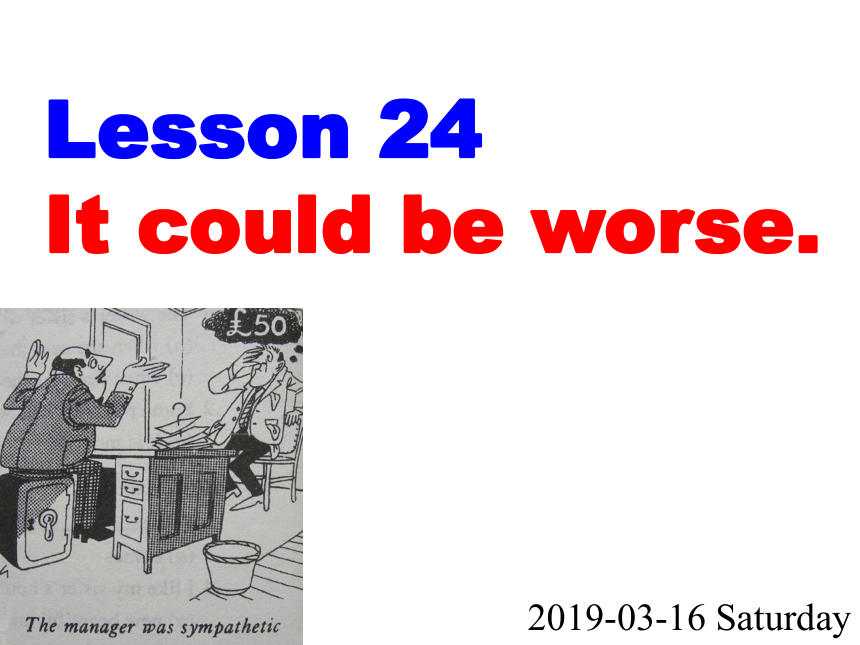 | |
| 格式 | pptx | ||
| 文件大小 | 18.1MB | ||
| 资源类型 | 教案 | ||
| 版本资源 | 新概念英语 | ||
| 科目 | 英语 | ||
| 更新时间 | 2023-12-23 20:42:39 | ||
图片预览


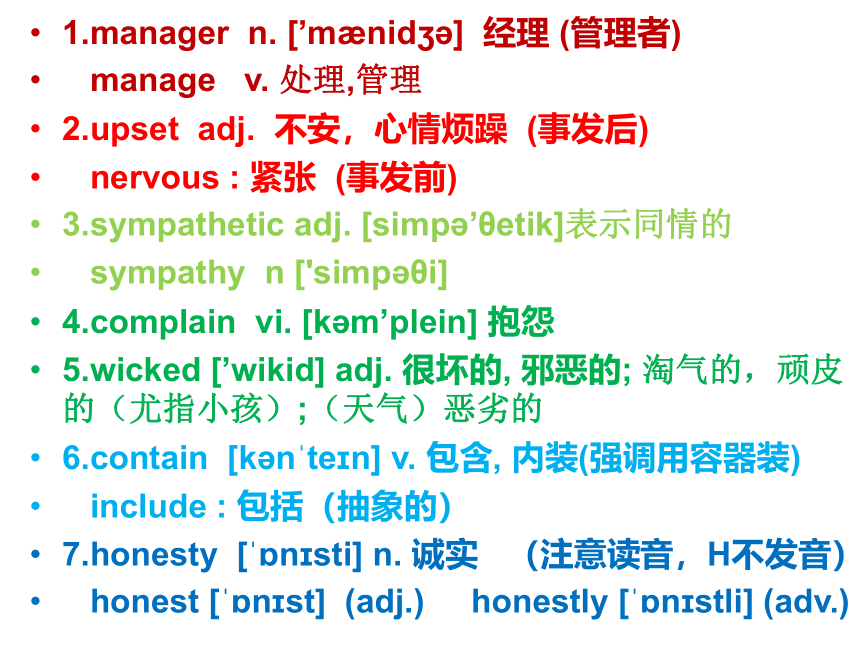


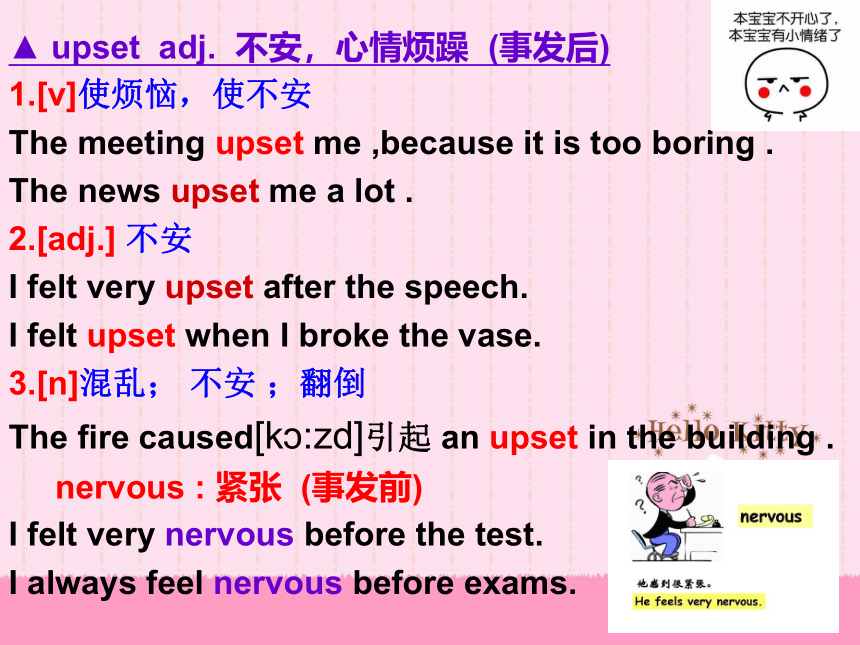
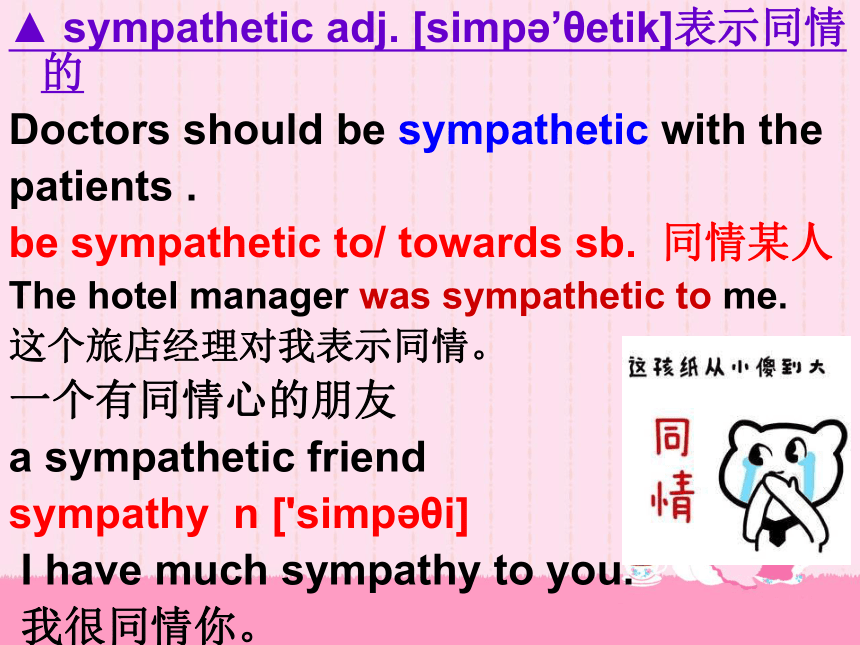
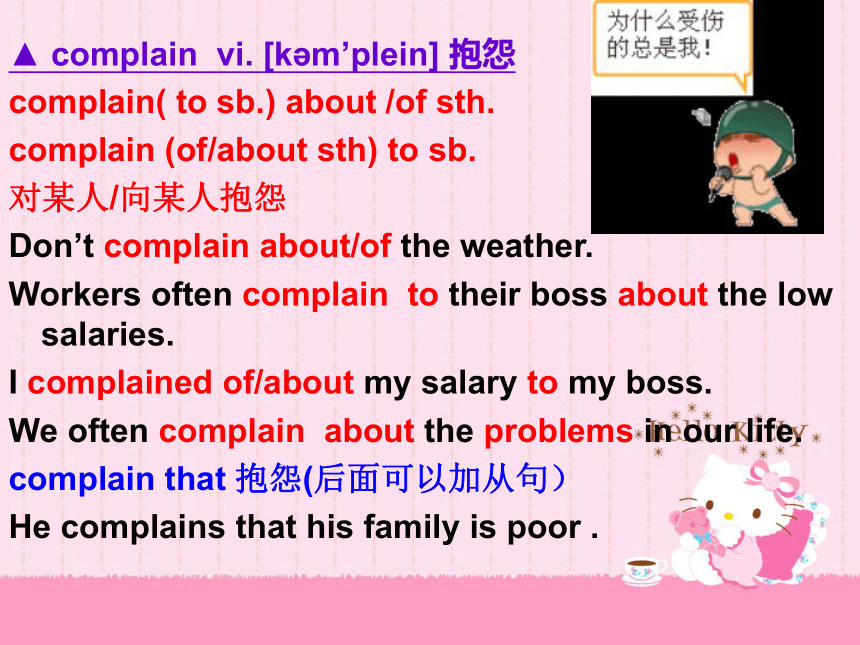


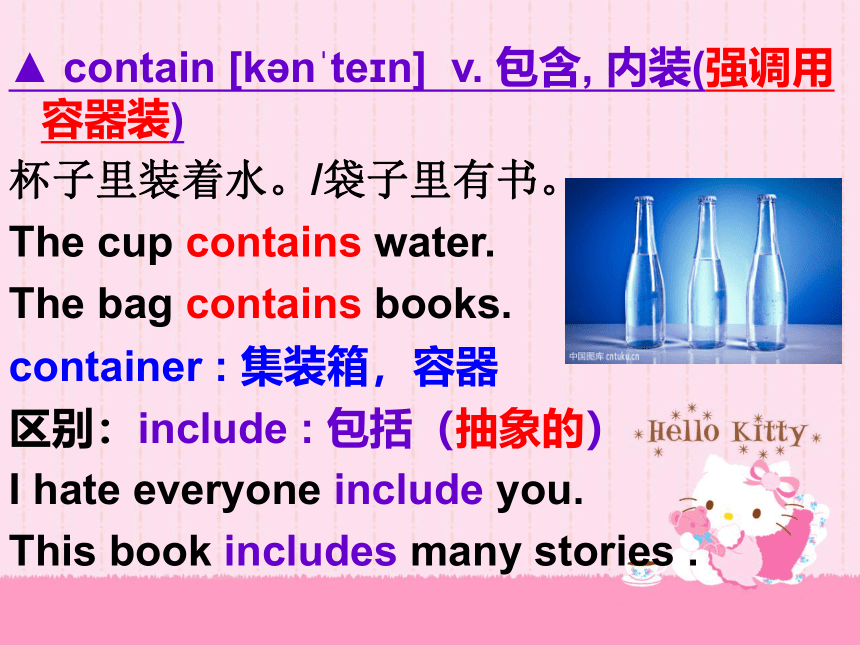
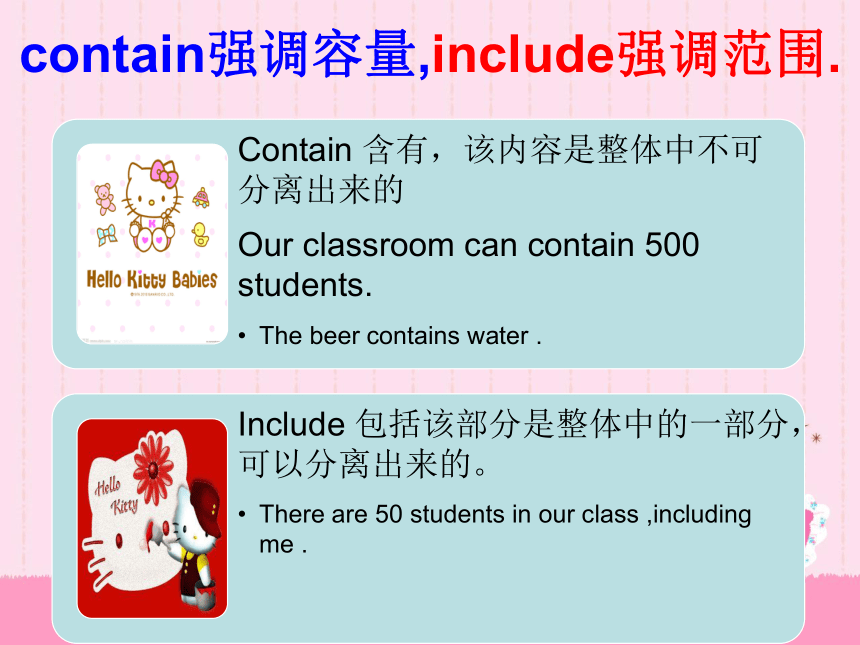
文档简介
(共50张PPT)
Lesson 24
It could be worse.
2019-03-16 Saturday
New words
1.manager n. [’m nid ] 经理 (管理者)
manage v. 处理,管理
2.upset adj. 不安,心情烦躁 (事发后)
nervous : 紧张 (事发前)
3.sympathetic adj. [simp ’θetik]表示同情的
sympathy n ['simp θi]
4.complain vi. [k m’plein] 抱怨
5.wicked [’wikid] adj. 很坏的, 邪恶的; 淘气的,顽皮的(尤指小孩);(天气)恶劣的
6.contain [k n te n] v. 包含, 内装(强调用容器装)
include : 包括(抽象的)
7.honesty [ n sti] n. 诚实 (注意读音,H不发音)
honest [ n st] (adj.) honestly [ n stli] (adv.)
New words and expressions
▲manager n. [’m nid ] 经理 (管理者)
They want a secretary to the general manager.
他们需要一位总经理秘书。
manage v. 处理,管理
I want to manage my own company .
-Need a hand
-Thanks. I can manage it myself!
[ 考点提示]
manage to do 意为设法做成功某事,
try to do 意为设法做, 但不一定成功。
▲ upset adj. 不安,心情烦躁 (事发后)
1.[v]使烦恼,使不安
The meeting upset me ,because it is too boring .
The news upset me a lot .
2.[adj.] 不安
I felt very upset after the speech.
I felt upset when I broke the vase.
3.[n]混乱; 不安 ;翻倒
The fire caused[k :zd]引起 an upset in the building .
nervous : 紧张 (事发前)
I felt very nervous before the test.
I always feel nervous before exams.
▲ sympathetic adj. [simp ’θetik]表示同情的
Doctors should be sympathetic with the
patients .
be sympathetic to/ towards sb. 同情某人
The hotel manager was sympathetic to me.
这个旅店经理对我表示同情。
一个有同情心的朋友
a sympathetic friend
sympathy n ['simp θi]
I have much sympathy to you.
我很同情你。
▲ complain vi. [k m’plein] 抱怨
complain( to sb.) about /of sth.
complain (of/about sth) to sb.
对某人/向某人抱怨
Don’t complain about/of the weather.
Workers often complain to their boss about the low salaries.
I complained of/about my salary to my boss.
We often complain about the problems in our life.
complain that 抱怨(后面可以加从句)
He complains that his family is poor .
▲ wicked [’wikid] adj. 很坏的, 邪恶的
① adj. 邪恶的,坏的(道德上的坏,可用 “evil” 替代, evil/devil 魔鬼,在英文中指的是“邪恶”
She saw a wicked smile on his face.
You are a devil. 你太邪恶了。
② adj. 淘气的,顽皮的(尤指小孩)
Don’t be so wicked, Tom.
③ adj.(天气)恶劣的
Few people walked about in this wicked weather.
It is wicked of sb to do sth .
It is wicked of you to hit your dog.
Guess:
a wicked world
邪恶的世界
wicked deeds
恶劣的行为
a wicked smile
不怀善意的微笑
a wicked boy
一个淘气的男孩
▲ contain [k n te n] v. 包含, 内装(强调用容器装)
杯子里装着水。/袋子里有书。
The cup contains water.
The bag contains books.
container : 集装箱,容器
区别:include : 包括(抽象的)
I hate everyone include you.
This book includes many stories .
contain强调容量,include强调范围.
▲ honesty [ n sti] n. 诚实 注意读音,H不发音
诚实至上。
Honesty is the best policy[‘p l s ] 策略,方针.
honest (adj.)
To be honest, you are great!
honestly (adv.)
Honestly, he is not that good!
老实说,我不相信他。
To be honest
To tell you the truth. 坦诚的说
Summary
1.manage to do 意为设法做成功某事,
try to do 意为设法做, 但不一定成功。
2.be sympathetic to/ towards sb. 同情某人
complain( to sb.) about /of sth.
complain (of/about sth) to sb.
complain that 抱怨(后面可以加从句)
3.It is wicked of sb to do sth 做某件事对某人不好
4.To be honest
=To tell you the truth. 坦诚的说
〖text〗
Sept 1:
Please read the text quickly, mark the words that can't be pronounced or whose pronunciation is uncertain, and mark the words that you don't know or the sentences that you can't understand.
1.I entered the hotel manager's office and sat down.
2.I had just lost $50 and I felt very upset.
3.'I left the money in my room,' I said, 'and it's not there now.'
4.The manager was sympathetic, but he could do nothing.
5.'Everyone's losing money these days,' he said.
6.He started to complain about this wicked world but was interrupted by a knock at the door.
7.A girl came in and put an envelope on his desk.
8.It contained $50.
9. 'I found this outside this gentleman's room,' she said.
10.'Well,' I said to the manager, 'there is still some honesty in this world!'
Sept 2:
Please read the text for the second time,then translate the text roughly according to your own understanding.
1.I entered the hotel manager's office and sat down.
2.I had just lost $50 and I felt very upset.
3.'I left the money in my room,' I said, 'and it's not there now.'
4.The manager was sympathetic, but he could do nothing.
5.'Everyone's losing money these days,' he said.
6.He started to complain about this wicked world but was interrupted by a knock at the door.
7.A girl came in and put an envelope on his desk.
8.It contained $50.
9. 'I found this outside this gentleman's room,' she said.
10.'Well,' I said to the manager, 'there is still some honesty in this world!'
我走进饭店经理的办公室, 坐了下来. 我刚刚丢了50 英镑, 感到非常烦恼. “我把钱放在房间里, “我说,“可现在没有了. “经理深表同情, 但却无能为力. “现在大家都在丢钱, “他说. 他开始抱怨起这个邪恶的世道来, 却被一阵敲门声打断了. 一个姑娘走了进来, 把一个信封放在了他桌上. 它里面装着50 英镑. “这是我在这位先生的房门外捡到的, “她说. “是啊, “我对那位经理说, “这世界上还是有诚实可言的!”
Sept 3:
Please read the text quickly for the third time and watch the video.
Do you agree
Do you think the world is ‘wicked’
Why Why not
Text explanation
1、I entered the hotel manager's office and sat down.
the hotel manger’s office
名词可以修饰名词
telephone number 电话号码
the village fair 乡村集市
(the fair of the village =
the fair in the village)
2、I had just lost $50 and I felt very upset. 'I left the money in my room,' I said, 'and it's not there now.'
lose vt. 遗失,丢失(宾语一般为钱物)
I lost my purse yesterday .
lost [adj]丢失的,失去的
It reminds me of my lost youth .
My money is lost.
loss [n] 困惑 遗失
I am at a loss what to do .
Don’t lose your key.
feel +形容词一般指心情“觉得……,感觉到……”
feel upset 心烦意乱,很苦恼
3、The manager was sympathetic, but he could do nothing.
could do nothing= could do nothing about it
对此事无能为力
I could do nothing for you.
区别: I can’t help you. 我不能帮你。
I could do nothing to help you.
我没有办法帮你, 我无能为力
Can you help me
Sorry,I could do nothing for you.
Certainly. / Of course. / It’s my pleasure.
4、'Everyone's losing money these days,' he said.
be doing 用进行时态取代一般现在时, 在英文是一种修辞方法, 表示不满, 一种感情. (进行时表示比较强烈的感彩)
We are looking forward to seeing you.
我们盼着见你们的面.
Grandpa is forgetting things now.
爷爷越来越健忘了.
days可以指“时期,时代”,in his boyhood days
(在他的童年时代)。
these days指“现今”用进行时态取代一般现在时,
5、He started to complain about this wicked
world but was interrupted by a knock at the door.
complain about sth. 抱怨某事
start to do sth. = start doing sth.
开始做某事,两者无区别
He started to learn English.
He started learning English.
be interrupted by被…打断
Don’t interrupt people when they are talking.
a knock at the door (敲门声)
knock at the door (敲门, 指动作)
< start, begin >
1) n. 开始,开端 start = beginning
在开始时 at the start/ beginning of…
在….结束时 at the end of
At the start\beginning of the meeting, we gave the reporter记者 a big hand.
2)begin/start to do sth. = begin/start doing sth.
开始做某事
His family began\started to do the business several years ago.
注意:如果begin和start本身用于进行时态,则只能用to do 的结构。
We are beginning to learn\study Good English now.
6、A girl came in and put an envelope on the desk.
= A girl came in with an envelope and put it on the desk.
7. It contained $50. 'I found this outside this gentleman's room,' she said.
outside prep./ adv. 外面 文中为介词
It’s now raining outside.
gentleman
n.阁下, 先生, 有身分的人, 绅士,
常用在 男厕所,公众场合
8. 'Well,' I said to the manager, 'there is still some honesty in this world!‘
still [adv]仍然
I still love you .
Do you still want to leave me
[adj.] 静止的,不动的。
Stand still .站着别动。
not…but… 不是…而是…
连接主语时使用就近原则
不是你而是我是老师。
Not you but I am a teacher.
我喜欢的是看电影而不是逛街。
I don’t like going shopping but watching movies.
nothing but…. 只不过
教室里除了一张桌子什么都没有。
There is nothing but a desk in the classroom.
酒店经理办公室
the hotel manger’s office
心烦意乱,很苦恼
feel upset
对此事无能为力
could do nothing
现今
these days
抱怨某事
complain about sth.
开始做某事
begin/start to do sth.= begin/start doing sth.
被…打断
be interrupted by
敲门声
a knock at the door
敲门, 指动作
knock at/on the door
在开始时
at the start/ beginning of…
在….结束时
at the end of
他刚刚丢了他的身份证,感到很苦恼。
He’s just lost his ID card and feels very upset
我把钥匙忘在图书馆了。
I left my keys in the library.
老板深表同情,但却无能为力。
The boss was sympathetic, but he could do nothing.
我在盒子里发现了这本书。
I found the book in the box.
世界上还是有诚实可言的。
There is still some honesty in the world.
Key structures
感叹句
感叹句:
What + a/an + adj. +可单 + 主语+谓语动词
What + adj. + 可复 +主语+ 谓语动词
What + adj. +不可数名词 +主语+谓语动词
How + adj./adv. +主语+谓语
把下列句子变成感叹句(P105 B)
1.This is a wonderful garden!
What a wonderful garden this is!
2.He is causing a lot of trouble!
What a lot of trouble he is causing!
3.It is a tall building!
What a tall building it is!
4.You are a clever girl.
What a clever girl you are!
It is quite a nice present.→
_____ _____ nice present!
2. We have fine weather today.→
_____ _____ weather we have today!
3. The children are working hard.→
_____ _____ the children are working!
4. She played basketball wonderfully.→
_____ __________ she played basketball!
5. He was doing well in dancing.→
_____ a _____ dancer he was!
What a
What fine
How hard
How wonderfully
What good
what 与how 有时可以互换
What a lovely girl she is!
=How lovely the girl is!
--Kate has won the first prize in the singing competition.
--______pleasant surprise this gave her classmates!
What B. How C. What a D. How a
抽象名词并非都作不可数名词。有些抽象名词在具体化后就变成可数名词。surprise(惊奇,不可数)
a surprise(令人吃惊的人或事,可数) 再如experience。
C
1 He handed the prize to me.
2 The waiter brought the man a bottle of beer.
3 I've ordered you some soup.
4 Bring me that book please!
5 She promised the finder a reward.
D
1 haven't any/have no money.
2 I didn't go anywhere/went nowhere in the
holidays.
3 There wasn't anybody/was nobody present
when the accident happened.
E1 It's George's.
2 It's that woman's.
3 I like Keats' poetry best.
4 They're the children's.
5 They're the soldiers'.
F 1 off 2 back 3 up 4 over 5 on 6 away
G 1 I put my hat on.
2 I took my coat off.
3 He put the fire out.
4 They cut the king's head off
多项选择题答案
1b 2a
3a 4c 5a 6a 7 c
8 c 9 c 10 b 11a 12 b
Homework:2019-03-16
1.熟背24课课文
2.复习24课单词短语
3.完成24课KKL.
4.复习21-24课的笔记,下次课测试
Don't aim for succeif you want it; just do what you love and believe in, and it will come naturally.
如果你想要成功,不要去追求成功;尽管做你自己热爱的事情并且相信它,成功自然到来。
Thank you for listening!
Lesson 24
It could be worse.
2019-03-16 Saturday
New words
1.manager n. [’m nid ] 经理 (管理者)
manage v. 处理,管理
2.upset adj. 不安,心情烦躁 (事发后)
nervous : 紧张 (事发前)
3.sympathetic adj. [simp ’θetik]表示同情的
sympathy n ['simp θi]
4.complain vi. [k m’plein] 抱怨
5.wicked [’wikid] adj. 很坏的, 邪恶的; 淘气的,顽皮的(尤指小孩);(天气)恶劣的
6.contain [k n te n] v. 包含, 内装(强调用容器装)
include : 包括(抽象的)
7.honesty [ n sti] n. 诚实 (注意读音,H不发音)
honest [ n st] (adj.) honestly [ n stli] (adv.)
New words and expressions
▲manager n. [’m nid ] 经理 (管理者)
They want a secretary to the general manager.
他们需要一位总经理秘书。
manage v. 处理,管理
I want to manage my own company .
-Need a hand
-Thanks. I can manage it myself!
[ 考点提示]
manage to do 意为设法做成功某事,
try to do 意为设法做, 但不一定成功。
▲ upset adj. 不安,心情烦躁 (事发后)
1.[v]使烦恼,使不安
The meeting upset me ,because it is too boring .
The news upset me a lot .
2.[adj.] 不安
I felt very upset after the speech.
I felt upset when I broke the vase.
3.[n]混乱; 不安 ;翻倒
The fire caused[k :zd]引起 an upset in the building .
nervous : 紧张 (事发前)
I felt very nervous before the test.
I always feel nervous before exams.
▲ sympathetic adj. [simp ’θetik]表示同情的
Doctors should be sympathetic with the
patients .
be sympathetic to/ towards sb. 同情某人
The hotel manager was sympathetic to me.
这个旅店经理对我表示同情。
一个有同情心的朋友
a sympathetic friend
sympathy n ['simp θi]
I have much sympathy to you.
我很同情你。
▲ complain vi. [k m’plein] 抱怨
complain( to sb.) about /of sth.
complain (of/about sth) to sb.
对某人/向某人抱怨
Don’t complain about/of the weather.
Workers often complain to their boss about the low salaries.
I complained of/about my salary to my boss.
We often complain about the problems in our life.
complain that 抱怨(后面可以加从句)
He complains that his family is poor .
▲ wicked [’wikid] adj. 很坏的, 邪恶的
① adj. 邪恶的,坏的(道德上的坏,可用 “evil” 替代, evil/devil 魔鬼,在英文中指的是“邪恶”
She saw a wicked smile on his face.
You are a devil. 你太邪恶了。
② adj. 淘气的,顽皮的(尤指小孩)
Don’t be so wicked, Tom.
③ adj.(天气)恶劣的
Few people walked about in this wicked weather.
It is wicked of sb to do sth .
It is wicked of you to hit your dog.
Guess:
a wicked world
邪恶的世界
wicked deeds
恶劣的行为
a wicked smile
不怀善意的微笑
a wicked boy
一个淘气的男孩
▲ contain [k n te n] v. 包含, 内装(强调用容器装)
杯子里装着水。/袋子里有书。
The cup contains water.
The bag contains books.
container : 集装箱,容器
区别:include : 包括(抽象的)
I hate everyone include you.
This book includes many stories .
contain强调容量,include强调范围.
▲ honesty [ n sti] n. 诚实 注意读音,H不发音
诚实至上。
Honesty is the best policy[‘p l s ] 策略,方针.
honest (adj.)
To be honest, you are great!
honestly (adv.)
Honestly, he is not that good!
老实说,我不相信他。
To be honest
To tell you the truth. 坦诚的说
Summary
1.manage to do 意为设法做成功某事,
try to do 意为设法做, 但不一定成功。
2.be sympathetic to/ towards sb. 同情某人
complain( to sb.) about /of sth.
complain (of/about sth) to sb.
complain that 抱怨(后面可以加从句)
3.It is wicked of sb to do sth 做某件事对某人不好
4.To be honest
=To tell you the truth. 坦诚的说
〖text〗
Sept 1:
Please read the text quickly, mark the words that can't be pronounced or whose pronunciation is uncertain, and mark the words that you don't know or the sentences that you can't understand.
1.I entered the hotel manager's office and sat down.
2.I had just lost $50 and I felt very upset.
3.'I left the money in my room,' I said, 'and it's not there now.'
4.The manager was sympathetic, but he could do nothing.
5.'Everyone's losing money these days,' he said.
6.He started to complain about this wicked world but was interrupted by a knock at the door.
7.A girl came in and put an envelope on his desk.
8.It contained $50.
9. 'I found this outside this gentleman's room,' she said.
10.'Well,' I said to the manager, 'there is still some honesty in this world!'
Sept 2:
Please read the text for the second time,then translate the text roughly according to your own understanding.
1.I entered the hotel manager's office and sat down.
2.I had just lost $50 and I felt very upset.
3.'I left the money in my room,' I said, 'and it's not there now.'
4.The manager was sympathetic, but he could do nothing.
5.'Everyone's losing money these days,' he said.
6.He started to complain about this wicked world but was interrupted by a knock at the door.
7.A girl came in and put an envelope on his desk.
8.It contained $50.
9. 'I found this outside this gentleman's room,' she said.
10.'Well,' I said to the manager, 'there is still some honesty in this world!'
我走进饭店经理的办公室, 坐了下来. 我刚刚丢了50 英镑, 感到非常烦恼. “我把钱放在房间里, “我说,“可现在没有了. “经理深表同情, 但却无能为力. “现在大家都在丢钱, “他说. 他开始抱怨起这个邪恶的世道来, 却被一阵敲门声打断了. 一个姑娘走了进来, 把一个信封放在了他桌上. 它里面装着50 英镑. “这是我在这位先生的房门外捡到的, “她说. “是啊, “我对那位经理说, “这世界上还是有诚实可言的!”
Sept 3:
Please read the text quickly for the third time and watch the video.
Do you agree
Do you think the world is ‘wicked’
Why Why not
Text explanation
1、I entered the hotel manager's office and sat down.
the hotel manger’s office
名词可以修饰名词
telephone number 电话号码
the village fair 乡村集市
(the fair of the village =
the fair in the village)
2、I had just lost $50 and I felt very upset. 'I left the money in my room,' I said, 'and it's not there now.'
lose vt. 遗失,丢失(宾语一般为钱物)
I lost my purse yesterday .
lost [adj]丢失的,失去的
It reminds me of my lost youth .
My money is lost.
loss [n] 困惑 遗失
I am at a loss what to do .
Don’t lose your key.
feel +形容词一般指心情“觉得……,感觉到……”
feel upset 心烦意乱,很苦恼
3、The manager was sympathetic, but he could do nothing.
could do nothing= could do nothing about it
对此事无能为力
I could do nothing for you.
区别: I can’t help you. 我不能帮你。
I could do nothing to help you.
我没有办法帮你, 我无能为力
Can you help me
Sorry,I could do nothing for you.
Certainly. / Of course. / It’s my pleasure.
4、'Everyone's losing money these days,' he said.
be doing 用进行时态取代一般现在时, 在英文是一种修辞方法, 表示不满, 一种感情. (进行时表示比较强烈的感彩)
We are looking forward to seeing you.
我们盼着见你们的面.
Grandpa is forgetting things now.
爷爷越来越健忘了.
days可以指“时期,时代”,in his boyhood days
(在他的童年时代)。
these days指“现今”用进行时态取代一般现在时,
5、He started to complain about this wicked
world but was interrupted by a knock at the door.
complain about sth. 抱怨某事
start to do sth. = start doing sth.
开始做某事,两者无区别
He started to learn English.
He started learning English.
be interrupted by被…打断
Don’t interrupt people when they are talking.
a knock at the door (敲门声)
knock at the door (敲门, 指动作)
< start, begin >
1) n. 开始,开端 start = beginning
在开始时 at the start/ beginning of…
在….结束时 at the end of
At the start\beginning of the meeting, we gave the reporter记者 a big hand.
2)begin/start to do sth. = begin/start doing sth.
开始做某事
His family began\started to do the business several years ago.
注意:如果begin和start本身用于进行时态,则只能用to do 的结构。
We are beginning to learn\study Good English now.
6、A girl came in and put an envelope on the desk.
= A girl came in with an envelope and put it on the desk.
7. It contained $50. 'I found this outside this gentleman's room,' she said.
outside prep./ adv. 外面 文中为介词
It’s now raining outside.
gentleman
n.阁下, 先生, 有身分的人, 绅士,
常用在 男厕所,公众场合
8. 'Well,' I said to the manager, 'there is still some honesty in this world!‘
still [adv]仍然
I still love you .
Do you still want to leave me
[adj.] 静止的,不动的。
Stand still .站着别动。
not…but… 不是…而是…
连接主语时使用就近原则
不是你而是我是老师。
Not you but I am a teacher.
我喜欢的是看电影而不是逛街。
I don’t like going shopping but watching movies.
nothing but…. 只不过
教室里除了一张桌子什么都没有。
There is nothing but a desk in the classroom.
酒店经理办公室
the hotel manger’s office
心烦意乱,很苦恼
feel upset
对此事无能为力
could do nothing
现今
these days
抱怨某事
complain about sth.
开始做某事
begin/start to do sth.= begin/start doing sth.
被…打断
be interrupted by
敲门声
a knock at the door
敲门, 指动作
knock at/on the door
在开始时
at the start/ beginning of…
在….结束时
at the end of
他刚刚丢了他的身份证,感到很苦恼。
He’s just lost his ID card and feels very upset
我把钥匙忘在图书馆了。
I left my keys in the library.
老板深表同情,但却无能为力。
The boss was sympathetic, but he could do nothing.
我在盒子里发现了这本书。
I found the book in the box.
世界上还是有诚实可言的。
There is still some honesty in the world.
Key structures
感叹句
感叹句:
What + a/an + adj. +可单 + 主语+谓语动词
What + adj. + 可复 +主语+ 谓语动词
What + adj. +不可数名词 +主语+谓语动词
How + adj./adv. +主语+谓语
把下列句子变成感叹句(P105 B)
1.This is a wonderful garden!
What a wonderful garden this is!
2.He is causing a lot of trouble!
What a lot of trouble he is causing!
3.It is a tall building!
What a tall building it is!
4.You are a clever girl.
What a clever girl you are!
It is quite a nice present.→
_____ _____ nice present!
2. We have fine weather today.→
_____ _____ weather we have today!
3. The children are working hard.→
_____ _____ the children are working!
4. She played basketball wonderfully.→
_____ __________ she played basketball!
5. He was doing well in dancing.→
_____ a _____ dancer he was!
What a
What fine
How hard
How wonderfully
What good
what 与how 有时可以互换
What a lovely girl she is!
=How lovely the girl is!
--Kate has won the first prize in the singing competition.
--______pleasant surprise this gave her classmates!
What B. How C. What a D. How a
抽象名词并非都作不可数名词。有些抽象名词在具体化后就变成可数名词。surprise(惊奇,不可数)
a surprise(令人吃惊的人或事,可数) 再如experience。
C
1 He handed the prize to me.
2 The waiter brought the man a bottle of beer.
3 I've ordered you some soup.
4 Bring me that book please!
5 She promised the finder a reward.
D
1 haven't any/have no money.
2 I didn't go anywhere/went nowhere in the
holidays.
3 There wasn't anybody/was nobody present
when the accident happened.
E1 It's George's.
2 It's that woman's.
3 I like Keats' poetry best.
4 They're the children's.
5 They're the soldiers'.
F 1 off 2 back 3 up 4 over 5 on 6 away
G 1 I put my hat on.
2 I took my coat off.
3 He put the fire out.
4 They cut the king's head off
多项选择题答案
1b 2a
3a 4c 5a 6a 7 c
8 c 9 c 10 b 11a 12 b
Homework:2019-03-16
1.熟背24课课文
2.复习24课单词短语
3.完成24课KKL.
4.复习21-24课的笔记,下次课测试
Don't aim for succeif you want it; just do what you love and believe in, and it will come naturally.
如果你想要成功,不要去追求成功;尽管做你自己热爱的事情并且相信它,成功自然到来。
Thank you for listening!
同课章节目录
